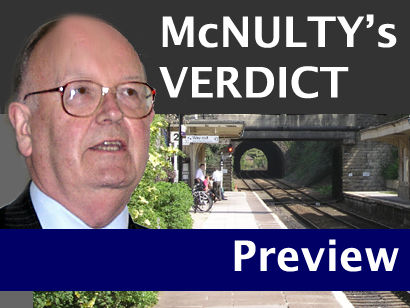THE McNulty report on railway 'value for money' seems set to receive a robust response from rail unions later today.
The unions have already been voicing their resentment at suggestions that railway staff are overpaid. There is also concern about the possibility of allowing private sector train operators to maintain some parts of the network.
Sir Roy McNulty has maintained that £1 billion a year could be saved. That's the equivalent of 20 per cent of the present public subsidy to railways in Britain.
He is expected to say that some sections of the railway are overstaffed, with his particular targets likely to be ticket offices and the continuing presence of conductors on some commuter routes.
Network Rail is already devolving responsibility for maintenance to individual routes, which are becoming semi-autonomous business units. But the discussions now taking place envisage a return to some vertical reintegration, with certain train operators assuming responsibility for maintenance on their networks.
If the predictions are on track, then Sir Roy will also be recommending a reduction in the size of the railway workforce to cut the wages bill as part of his annual savings of £1 billion annually, which he believes is achievable by 2018.
One of his benchmarks will be the comparative costs of other railways in Europe, which are said to be 30 per cent lower.
But unions say the higher costs in Britain are often caused by the complex structure of railway privatisation here, which is not mirrored in other countries, and are bitterly critical of pay levels for senior executives in the franchise-owning groups.
They are also opposing any return of maintenance to the private sector, pointing out that Railtrack was a failure.
It's just over 48 years since Doctor (later Lord) Beeching published his controversial report 'The Reshaping of British Railways'. This was followed by a major programme of closures, which is not thought to be part of the McNulty agenda.
Even so, the rail unions are remaining gloomy about the implications of Sir Roy's analysis, due to be published this morning.
The general secretary of ASLEF, Keith Norman, said: "It would take a special person to remain in moan mode while passenger figures increase, punctuality improves, journey times decrease and delays drastically reduce. But I think the government might have found just the man."
McNulty report set to trigger clash with rail unions
19th May 2011


